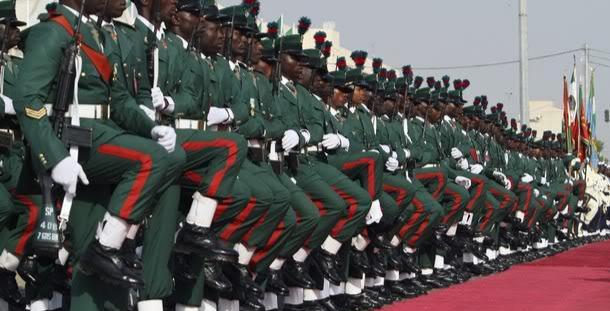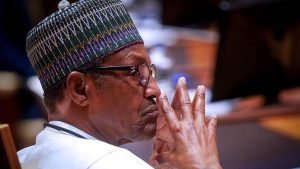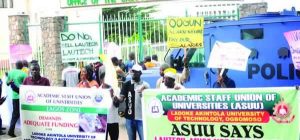
The Nigerian military is ranked 4th in Africa by Global Firepower (GFP), a world military ranking platform. The country has a military human power of 120,000 personnel, which is a total of 0.1% of a population of over two hundred million people. Yet, Nigeria has a population in which 43,000,000 people are generally considered fit for military service, and 3,454,461 reach the age for recruitment into the military on a yearly basis. Against the backdrop of a high rate of attrition in the military – people reaching retirement in their hundreds every year, men and officers being discharged for various statutory issues, men and officers being injured and hospitalised, and people dying while in service to the nation – the numerical strength of the Nigerian military is strong cause for national concern.
Macrotrends reports that the Nigerian military had major declines in budget spending from 2012 to 2017 – 12.39% between 2014 to 2015, 16.57% between 2015 and 2016, and 5.92% between 2016 to 2017..Only in 2018 was there a reversal of the situation by an increase in spending of 0.08% of the GDP. Despite the need to invest fortunes in marshalling the operations of her military in a state of war, Nigeria had actually been on an opposite trajectory for many years.
Some analysts attributed the low funding of the military during the military era to the need of dictators to disempower subordinates in the barracks, trenches and dockyard. On the heels of the 4th Republic, however, the military did not receive much of a huge improvement in funding to critically enhance its welfare, human power and firepower, such that would give the nation the measure of security and peace that she desires.
In its overview of the nation’s airpower, Global Firepower states that Nigeria has only eight professional jet fighters, 44 helicopters, and 15 attack helicopters. The World Directory of Modern Military Aircraft however (WDMMA) differs from Global Firepower, stating that the Nigerian Air Force has 132 aircrafts in their varied levelled of readiness. The platform notes that Nigeria had invested more in trainers (40.2%) than in machinery like helicopters (22%), transports (18.2%), jet fighters (15.9%) and special mission (3.7%). The indication is that the Air Force has cause to focus less on special missions and more on equipping trainers on existing and functional machines. The Directory extends the outlook on the levels of readiness of the aircraft. It puts the total Nigeria Air Force crafts at 132, with only 106 of them in best of shape and functionality, while 92 to 99 aircraft fluctuate between readiness and average maintenance. 66 Nigerian aircraft are in poor shape and need immediate intervention.
Nigeria, according Military Factory has warfare aircrafts like the Aermachhi MB.339, Aero L-39 Albatros, Airbus Helicopters AS532 and other ranges like Mil Mi-34 (Hermit) and the PAC Super Mushshak were purchased from different countries between 1978 to 1996. However, the Nigerian Air Force has concentrated its human power on providing support (58 units) for members of the Nigerian military on the grounds, and training (53 units) for members and new entrants of the Air service. WDMMA rates the Nigeria Air Force low in the engagement of futuristic research and development (34 Units), and in its capacity to engage in Attacks (21 units). At the 2019 NAF Finance Training Workshop, Air Marshal Sadiq Abubakar, the Chief of Air Staff, told the media that Nigeria recently acquired 22 new combat aircrafts to support the many military operations in the country. He gave a ‘pass mark’ to the Nigeria Armed Forces in the fight against insurgency despite the strain of being underfunded by the Federal Government.
In a presentation on ‘Airpower and the Nigerian Navy’, Charles Dokubo, a research professor at the Nigerian Institute of International Affairs, had advised that ‘The manpower requirement of the NAF should be increased and training enhanced. With the concept of joint operations and the engagement of the NAF in national defence, sub-regional activities and internal security duties, the current level will overstretch the present manpower holding. There would be the need for the Federal Government to increase the Ministry of Defence allocation for the NAF to redress these shortcomings. The redressing of these issues would place NAF in a position to effectively and efficiently perform its constitutional roles.’
Dokubo had raised concerns about the need to refurbish radar Alphajets and pleaded against the deployment low capacity jets to do the work of high powered Alphajets. ‘Situations where Jets like the MIG-21 are grounded due to lack of available spare parts should be avoided by the purchase of new, efficient and popular aircrafts, while old ones should be remodelled by Nigerian and foreign experts who serve the nation. While the NAF must continue to train its men, it should never relent in collaborating with other members of the Nigerian forces to execute mock land and air operations for effective coordination in present and future wars. While it must be available at all times to push back external aggression, it must be flexible to deploy on the battlefield any needed change of order, while having it easy to move its aircraft across the length and breadth of the country without any fear of unprecedented aircraft damages.’
The Nigerian Army, known as the 3rd strongest ground force in Africa, has 253 tanks, 1,789 armoured vehicles and 25 self-propelled artillery. The army also has 339 towed artillery and 36 rocket launchers. The Nigerian Army has also been considered a global partner in the United Nations and ECOMOG missions. Its peacekeeping campaigns in West Africa in the 1990s
– are in line with its ‘big brother’ diplomatic role in Africa. It has also participated in Peace Support Operations in Africa, the Middle East and Europe. It is the fifth largest contributor of troops to the United Nations Peace Keeping Operations. Recently, however, the Nigerian government had begun disengaging from some of its foreign military commitments because of the need to give all internal and external threats the needed attention.
But how does the weaponry of the Nigerian Army fare in comparison with many other countries of the world, and more importantly in the context of the nation’s war against insurgency, banditry and other conflicts in various parts of the country?
Nextier SPD had noted that the Nigeria military is stretched thin in the war on terror. It compares Nigeria’s military human power figures to that of Pakistan, which is four times larger than that of Nigeria and asserts that the current human power is inadequate for the engagement of external aggression in the North East, and internal aggression in other parts of Nigeria.
The conversation on funding for the Nigerian military has always been a constant concern. The IMF and the World Bank recommend that, for nations at peace, about 1.5% of the budget should be spent on the nation’s military. Unfortunately, the Nigerian government has spent less than one per cent on a Nigerian military that is prosecuting a war. Underfunding of the Nigerian military has adversely affected the war against the insurgents in the North East. Recently, the Army approved the voluntary retirement of 356 Nigerian soldiers. It willingly released them because it preferred to have fighters who believe in the cause rather than potential saboteurs.
But such development should be place in proper perspective. Many Nigerian soldiers have been on the battlefield without any respite or break. Some have not been with their families in years and are concerned about the consequences of their perpetual absence from families who are in turn not in the best financial state. The failure to adequately rotate soldiers and officers at the battlefields is largely because there are huge gaps in human numbers. The military people are human beings with flesh and blood, and with families, like everyone else. The willing horse certainly has critical limits. To raise the bar against the fight on Boko Haram, ReliefWeb noted that the government must provide psychological support for the military. Recently, the Chief of Army Staff, Lieutenant General T. Y. Buratai stated that ‘new platforms and equipment are being procured to replace old and obsolete variants of APCs, TKs and Artillery Pieces. General Buratai pointed out that ‘the Nigerian Army is capable of fulfilling its set objectives and has constantly engaged in training sessions, and an expert audit of its capabilities through protracted land operation.
The Army has the ability to navigate riverine areas, jungles, deserts, and mountain terrains in order to respond to national threats. The army is also not oblivious of the evolving cyber-activities of terror groups, so it has also begun investing in its men to tackle violent non-state actors who have deployed technology to undermine the sovereignty of the state.’ While there are no doubts about what the Army has achieved in several regards, including significantly degrading the threat of insurgency, the gap in human numbers remain worrisome. The Army needs to begin a massive voluntary conscription programme that will enable it become a visible domineering force in the theatres of war.
Global Firepower also indicates critical shortfalls of the Nigerian Navy in terms of equipment, especially aircraft carriers, destroyers, and frigates. This is perhaps a reason behind the huge investments on patrols by the Nigerian Navy. Sanjay Badri-Maharaj, an independent defence analyst, explained that Nigeria Navy had been affected by funding due to the fall in oil prices, which had led to the ‘chronic serviceability’ of its ships. The analyst commended the local content production and maintenance of ships and boats at the Naval dockyard. In 2018 , the Nigerian Navy commissioned 16 New Patrol Boats. The analyst observed that the Nigerian Navy is slowly moving into being a viable force capable of performing critical missions in respect of EEZ surveillance and patrol. ‘It possesses an adequate fleet of inshore and riverine patrol craft and its growing refit and overhaul capabilities should prove adequate to the task of maintaining these vessels and augmenting them with new construction.’
In spite of its shortfalls, the Navy has made giant strides in improving the Nigerian water ways. The Nigerian Navy has stalled or destroyed the activities of more than 2,287 illegal maritime operators in the last five years, And has arrested hundreds of suspected smugglers among others. Being the forces saddled with securing the Nigerian waterways, it has not only secured Nigerian waterways but has made possible a safer gulf. The Navy has also helped dislodge maritime threats such as piracy, crude oil theft, illegal, unreported and unregulated fishing, hostage taking and drug trafficking. The activities of the Nigerian Navy on the internal waterways have saved Nigeria from losing more than 40 billion naira in potential resources.
The Nigerian Navy played a pivotal role in the reducing the success rate of pirate attacks from 72.86% in 2016 to 25% in 2018. Although there is room for improvement, it is clear to the pirates that the Nigerian Navy is a strong and formidable enemy. However, the Nigerian Navy continues to face capability gaps in respect of the number of major surface combatants as well as the weapon systems available to the fleet.
The Nigerian military remains a strong institution and a strong force on the continent, but that is only as far as a nation at peace is concerned. Nigeria is at war on at least two fronts – the Northeast and the Northwest. At this time, the Nigerian military needs a lot more support from the executive and legislative arms of government. The overall indication is that the Nigerian military needs a huge, critical enhancement in terms of unprecedented massive recruitments into the services, crash training of soldiers and ratings, and a massive procurement of arms and ammunitions. With these, the military should overrun the Boko Haram insurgents, bandits, and other troublemakers who are disrupting the peace of Nigeria.
Femi Morgan

